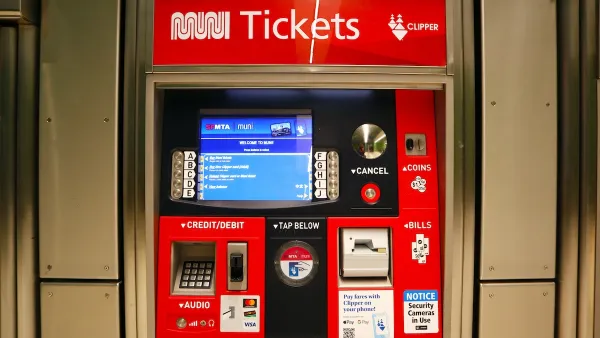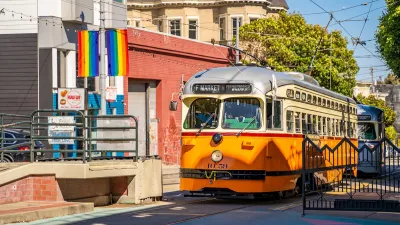On the San Francisco Municipal Transit Agency's (MUNI) centennial birthday, Zusha Elinson reports on the sad fact that service is slower than it was when it began 100 years ago.
Elinson traces the history of MUNI, which began in 1912 as a streetcar line, the A and B, which eventually ran from the ferries to the beach, and compares historic travel times for several routes compared to today and finds that, almost uniformly, they all have slowed.
Elinson turns to Peter Straus, a retired Muni service planner, to provide the reason for the somewhat depressing state of affairs, "Streetcars ruled the road, and there wasn't much getting in the way - no car traffic - and we didn't have all the traffic lights and stop signs," said Straus. "Back then it was basically ‘load and go,' " he added, "and there was nothing to slow them down."
Fret not, however, MUNI has plans to upend a century of slowing service on several lines. According to Elinson, "Officials at the San Francisco Municipal Transportation Agency are preparing a plan to speed several routes, including the 30, the J and the N. This is scheduled to be done by removing stop signs, programming traffic signals so they stay green for buses, creating additional bus-only traffic lanes and removing some bus stops."
FULL STORY: After 100 Years, Muni Has Gotten Slower

Planetizen Federal Action Tracker
A weekly monitor of how Trump’s orders and actions are impacting planners and planning in America.

Map: Where Senate Republicans Want to Sell Your Public Lands
For public land advocates, the Senate Republicans’ proposal to sell millions of acres of public land in the West is “the biggest fight of their careers.”

Restaurant Patios Were a Pandemic Win — Why Were They so Hard to Keep?
Social distancing requirements and changes in travel patterns prompted cities to pilot new uses for street and sidewalk space. Then it got complicated.

Platform Pilsner: Vancouver Transit Agency Releases... a Beer?
TransLink will receive a portion of every sale of the four-pack.

Toronto Weighs Cheaper Transit, Parking Hikes for Major Events
Special event rates would take effect during large festivals, sports games and concerts to ‘discourage driving, manage congestion and free up space for transit.”

Berlin to Consider Car-Free Zone Larger Than Manhattan
The area bound by the 22-mile Ringbahn would still allow 12 uses of a private automobile per year per person, and several other exemptions.
Urban Design for Planners 1: Software Tools
This six-course series explores essential urban design concepts using open source software and equips planners with the tools they need to participate fully in the urban design process.
Planning for Universal Design
Learn the tools for implementing Universal Design in planning regulations.
Heyer Gruel & Associates PA
JM Goldson LLC
Custer County Colorado
City of Camden Redevelopment Agency
City of Astoria
Transportation Research & Education Center (TREC) at Portland State University
Camden Redevelopment Agency
City of Claremont
Municipality of Princeton (NJ)





























